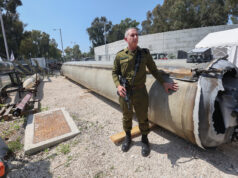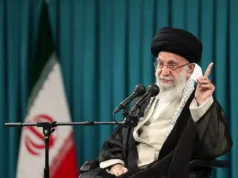War on ISIS
A small group of American military advisors have begun operating out of Anbar province, a traditionally restive province. Personnel at Ain al-Asad air base in the western province are already working to help train and assist the Iraqi Army’s seventh division, which suffered major setbacks during the IS advance. As part of the plan, the U.S. intends to arm Sunni tribesmen in Iraq with small arms, such as AK-47s, rocket-propelled grenades and mortar rounds, to help bolster them against IS.
Italy announced it would station four Tornado jet fighters in Kuwait for reconnaissance missions over Iraq. On November 19th, the French Defense Ministry said it would position six additional Mirage jets in the Middle East to help fight IS, adding to the 12 fighters already in the region.

Italy will send four Tornado aircraft to Iraq to serve in a reconnaissance role. (Photo: AFP) |
Israel Watch
In a move intended to promote gender equality, the IDF announced that it would shave four months off the mandatory three-year service period for men conscripted into most army units.
The Department of Defense awarded Elbit Systems a $29 million contract to provide logistics support for the USAF’s F-16 head-up display (HUD) assembly.
In an unprecedented move, an Israeli cabinet panel has rejected the Ministry of Defense’s decision to procure an additional 31 F-35 Joint Strike Fighters. The IAF is currently scheduled to purchase 32 aircraft and will not be able to complete two full squadrons as planned.
Defense News suggests that the Iron Dome’s Tamir missile could be adapted to combat the threat from unmanned aerial vehicles (UAV). Israel has traditionally relied on the Patriot missile batteries to intercept aerial threats, giving the Jewish State interoperability with the large American missile stockpile under nearby U.S. EUROCOM. However, at $2 million an interceptor, the IDF has begun looking for cheaper alternatives. Israel has used the Patriot missiles three times in the past four month to shoot down enemy drones.
The IAF gained aircraft certification from three branches of the U.S. Armed Forces, allowing Israeli military planes to engage in joint exercises and land in the U.S.
Israeli Military Technology
Israel Electric Company has developed an “Information Grid” with mPrest Systems that will help protect critical infrastructure from cyber attacks. The new technology checks energy flows throughout the power grid and stops any suspicious electricity “virus” from spreading.
The Israeli Air Force (IAF) announced plans to buy three additional Lockheed Martin C-130Js Super Hercules, adding to two C-130Js already in operation and two in production. The planes will increase the IDF’s ability to launch long range operations. During a recent training mission over Greece, Romania, and Bulgaria, the IAF tested the Israeli-produced systems installed in the aircraft.

The welcoming ceremony for Israel’s new C-130J. (Photo: Haaretz) |
Israeli Military Sales
Elbit Systems won a contract to provide Germany’s new A400M transport aircraft with anti-missile laser defense systems. The “J-Music” system will be installed within a year and was designed to intercept heat seeking surface to air man-portable missiles (MANPADS).
Egypt Watch
Egypt and the UAE continued their third joint military exercises, ‘Shiam al-Haq,’ or “Righteous Arrows,” the third such training this year.
Russia delivered S-300 surface-to-air missiles to Egypt earlier this month. Moscow had previously considered selling the advanced weapon system to Syria and Iran, but has indefinitely canceled or delayed the deliveries under international pressure.
Iraq Watch
The U.S. State Department approved the sale of up to 2,000 Precision Kill Weapon Systems (APKWS) to Baghdad at an estimated cost of $97 million. The systems can be deployed to helicopters, fighter aircraft, drones, and humvees. Separately the State Department approved $600 million of spare parts and service for tanks, armored vehicles and artillery.
Gulf Watch
Bahrain’s National Guard and the Kuwaiti security forces completed a two-day counter-terrorism exercise earlier this month. The drill aims to enhance cooperation and bolster combat readiness according to officials. The Gulf Cooperation Council (GCC) seeks to increase coordination between its member militaries with ministers even considering establishing a joint naval force.
The U.S. Navy deployed its first laser weapon system to the USS Ponce in the Persian Gulf. Mounted at the bow of a ship, the laser uses six separate beams to destroy an incoming drone or small ship from up to ten miles away. With its use of electricity to power the laser, the cost of each interception is incredibly low when compared to conventional weapons. Over the next several months, the system will be subjected to multiple test missions.

A Laser Weapon System (LaWS) prototype pictured aboard the USS Dewey in 2012. (Photo: U.S. Navy) |
Saudi security forces widened a buffer zone on the Iraqi border to 12 miles wide to help protect the Kingdom from IS fighters in Iraq.
The Department of Defense awarded Raytheon a $32 million contract modification to provide 500 Enhanced Paveway II guided bombs to the Royal Saudi Air Force.
Odds and Ends
A single seat Mig-25 ‘Foxbat’ fighter jet belonging to the Algerian Air Force crashed during a training mission near the Mediterranean Sea. The pilot safely ejected from the aircraft and investigators are examining the cause of the crash.
The House Sub-Committee on the Middle East and North Africa unanimously approved the United States-Jordan Defense Cooperation Act before King Abdullah visits next month. Under the bill, military aid would increase from $300 million up to $1 billion a year through 2019. The act also recommends that the State Department sign a memorandum of understanding to increase joint military exercises and other defense ties. Amman could also receive expedited approval of arm sales under the Arms Export Control Act of 1976.





